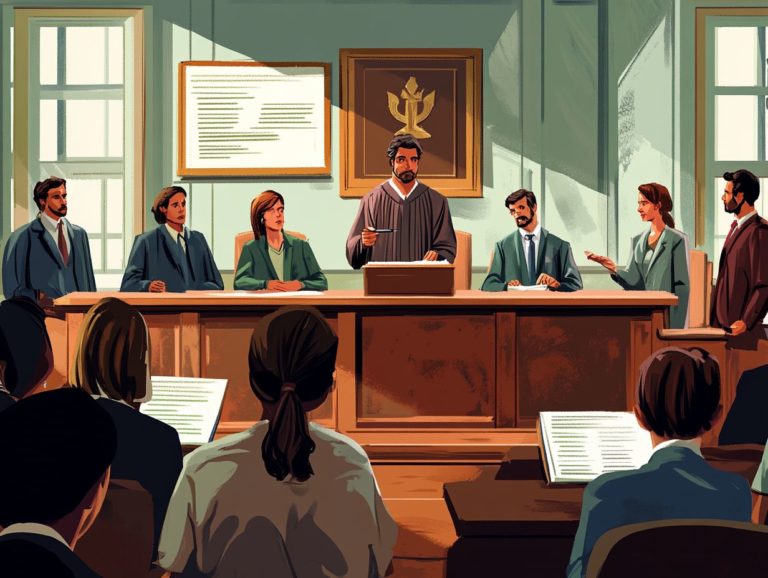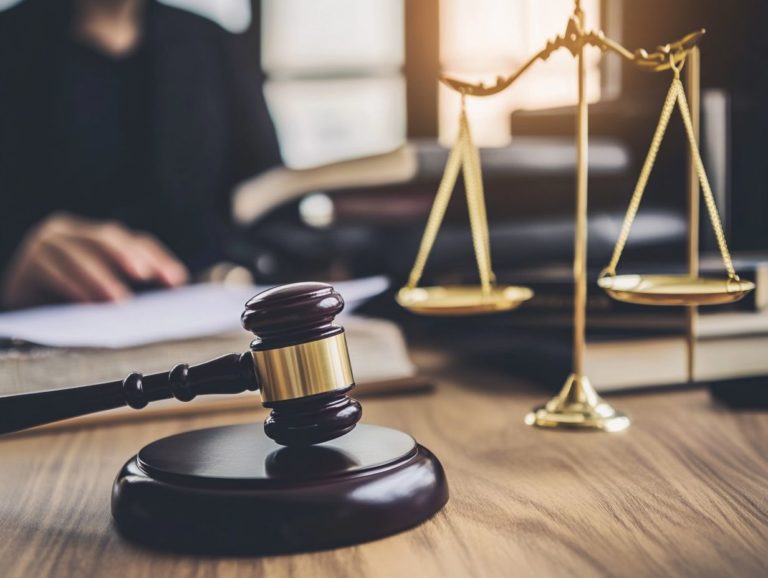How to Evaluate Your Defense Options
Understanding the law can feel overwhelming, especially when it comes to knowing your rights and the defense options available to you. You must act quickly to protect your rights.
Whether you face criminal charges or civil litigation, it s essential to evaluate the evidence against you and understand the potential consequences.
This article explores common defense strategies, highlights the importance of working with a defense attorney (a lawyer who helps you with your legal issues), and offers tips on finding the right legal representation for your situation. Get ready to take charge of your legal journey!
Arm yourself with the knowledge necessary to make well-informed decisions regarding your defense.
Contents
- Key Takeaways:
- Understanding Your Legal Rights
- Factors to Consider Before Choosing a Defense Strategy
- Evaluating Potential Consequences
- Common Defense Strategies in Legal Cases
- Working with a Defense Attorney
- Frequently Asked Questions
- What does it mean to consider your defense options?
- Why is it important to consider your defense options?
- What are some common defense options that can be considered?
- How can I assess which defense option is best for me?
- What are the benefits of considering your defense options?
- Can I change my defense strategy if I’ve already chosen a course of action?
Key Takeaways:
- Know your rights: Understand the defense options available to you.
- Make an informed decision: Weigh the evidence against you before selecting a strategy.
- Get professional help: A defense attorney can significantly improve your case.

Understanding Your Legal Rights
Understanding your legal rights is crucial when facing potential legal challenges. Just as a football coach develops a game strategy to enhance their team s performance, you must know your options and rights within the legal framework.
This knowledge is the foundation for making informed decisions and can significantly impact the outcome of your legal matters. Knowing your legal protections allows you to engage effectively with your defense team and ensures your rights are upheld throughout the process.
Overview of Defense Options
An overview of defense options in legal cases provides invaluable insights into the strategies at your disposal and the potential outcomes you may face. Understanding how different approaches can shape the course of a trial is crucial.
Lawyers often look at different defense options self-defense, an alibi, or expert testimony to determine which might improve your chances of success. The effectiveness of these options depends on the specifics of your case, including the nature of the charges and the quality of the evidence presented.
Look closely at each strategy’s strengths and weaknesses to make informed decisions that could influence your chances of success during legal proceedings.
Factors to Consider Before Choosing a Defense Strategy
Before you commit to a defense strategy, evaluate several factors that can impact its effectiveness similar to how football coaches assess players and game conditions during season planning.
Consider elements like the strength of the evidence against you and the complexities of legal tactics. A thorough analysis of these aspects will help you develop a well-rounded strategy that minimizes risks and maximizes your chances of success.
Assessing the Strength of Evidence Against You

Assessing the strength of the evidence against you is crucial for crafting an effective defense strategy. Carefully examining the evidence helps you spot weaknesses in the prosecution’s case and strengthens your overall legal response.
By systematically analyzing various forms of evidence from witness testimonies to physical artifacts you can identify the aspects to build a compelling defense. Engaging with legal precedents ensures that your approach aligns with established evaluation practices.
Incorporating expert opinions into this analysis can further enrich your strategy, guiding you toward a defense that addresses the accusations and resonates within the legal system.
Evaluating Potential Consequences
Evaluating potential consequences is essential when you’re developing a legal defense strategy. It’s crucial to grasp the implications of your decisions. This understanding can profoundly influence the choices you make throughout the legal process.
For example, the seriousness of possible penalties like fines or imprisonment often drives individuals and their counsel to adopt specific defensive tactics designed to mitigate these risks.
Engaging in open communication is vital for weighing your options effectively. By discussing potential outcomes honestly, you and your attorneys can work together to understand the law, crafting a strategy that addresses the current charges and anticipates repercussions from various defense avenues.
Common Defense Strategies in Legal Cases
In legal cases, understanding common defense strategies is crucial. This knowledge empowers you to make informed decisions about your approach, ensuring you’re well-equipped to advocate for your interests effectively.
Types of Defense Arguments
Different types of defense arguments can be employed in legal cases. Each is meticulously crafted to tackle specific challenges and utilize unique strategies.
For instance, self-defense is frequently invoked in violent crime cases. It provides a legal shield for actions taken when faced with an immediate threat.
On the other hand, the duress argument comes into play when someone is forced to commit an act due to imminent danger from another person.
Then there’s the insanity defense, which means claiming someone was not in their right mind during the incident.
Each of these strategies presents distinct advantages and potential hurdles in court, ultimately shaping the outcome of a case based on the circumstances at hand.
Working with a Defense Attorney

Collaborating with a defense attorney is essential for successfully navigating the legal system. Your effective partnership can significantly enhance your defense strategy and execution, ensuring that you are well-prepared for every step of the journey.
Benefits of Hiring a Lawyer
Hiring a lawyer offers a wealth of benefits that can significantly enhance your defense strategy and deepen your understanding of the legal process.
With their specialized knowledge, you can confidently navigate the legal landscape. An experienced attorney can pinpoint potential legal pitfalls and use their analytical skills to construct a compelling argument on your behalf.
They often have strong relationships within the legal community, smoothing the path for negotiations and potentially yielding favorable outcomes. By securing legal representation, you gain access to invaluable resources and insights, giving you the power to make informed decisions throughout your journey in the often intimidating world of law.
How to Find the Right Attorney for Your Case
Finding the right attorney for your case is a pivotal step in securing a successful legal defense. You need to evaluate their expertise and how well they align with your strategy.
Start by pinpointing the specific legal issues you re facing and the type of representation you need, whether it s criminal defense, family law, or personal injury.
Conduct thorough research on potential candidates check their credentials, experience, and client reviews. It s essential to consider their track record in similar cases, as this can greatly influence potential outcomes.
Schedule consultations; these initial meetings offer valuable insight into their approach and communication style. You want to ensure that the attorney understands the nuances of your situation and aligns with your objectives and values.
Frequently Asked Questions
What does it mean to consider your defense options?

When you consider your defense options, think about all the ways to protect yourself legally. This helps you pick the best path forward.
Why is it important to consider your defense options?
Considering your defense options is crucial for you to make informed decisions and choose the best strategy to protect your rights in a legal case.
What are some common defense options that can be considered?
Common defense options include:
- Pleading guilty
- Negotiating a plea deal (an agreement where you plead guilty to a lesser charge)
- Presenting a defense based on evidence
- Hiring a lawyer to represent you in court
How can I assess which defense option is best for me?
You can assess your defense options by considering factors like:
- The strength of the evidence against you
- The potential consequences of each option
- Your personal circumstances and priorities
What are the benefits of considering your defense options?
Thinking through your defense options helps you make smart choices, increases your chances of a favorable outcome, and can save you time and money in the long run.
Can I change my defense strategy if I’ve already chosen a course of action?
In most cases, you can change your defense strategy at any point in the legal process. However, discuss any changes with your lawyer and the court to ensure a smooth transition.






